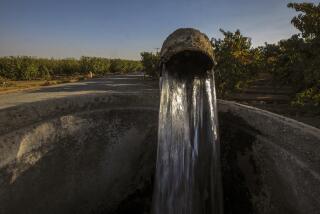Head Off New Water Wars
Think of the ugly battles of past droughts. Farmers pitted against cities, with the media showing pictures of flooded rice fields at a time when town and suburban lawns went unwatered and toilets unflushed. Cities vying for dwindling water supplies, north scorning south. The salmon losing out altogether.
The idea of regressing to this state of affairs is repellent, but an extraordinary seven-year effort to end California’s long, bitter water warfare is on the verge of collapse. The state’s elected officials in Sacramento and Washington need to rally their forces to prevent a return to water chaos that would threaten the reliability of Southern California’s supply and further risk the environment of two major rivers and the state’s biggest estuary.
Congress urgently needs to pass legislation to renew authorization of Cal-Fed, the $8.5-billion cooperative state-federal program to revitalize the Sacramento-San Joaquin Delta. The delta is the nexus of water systems that serve 22 million Californians, including all of coastal Southern California.
The state and federal governments are partners in Cal-Fed because they both have giant water projects drawing from the delta for shipment south. The massive sucking of the pumps has caused much of the environmental degradation of the delta, including alarming declines in fish populations.
Cal-Fed brought together the big users of this water--farmers and urban water agencies such as the Metropolitan Water District of Southern California--and the environmental community. They battled through thousands of hours of meetings to achieve a plan to restore the delta and upstream watershed, revive salmon runs, stabilize water supplies and improve the quality of the water exported to the south, now heavily laden with salt.
The agreement is unraveling largely because farmers believe too much money and water is going to the environment and not enough to their fields. They are asking Congress to give them what they couldn’t get through Cal-Fed, including costly new reservoirs. Environmentalists are appropriately skeptical about the need. Without Cal-Fed, the state’s water future would be management by lawsuit and politics.
The divisions are reflected in competing bills in Congress, SB 1768 by Sens. Dianne Feinstein and Barbara Boxer (both D-Calif.) and HR 3208 by Rep. Ken Calvert (R-Riverside).
The preferable Feinstein-Boxer measure is a simple reauthorization that ratifies a Cal-Fed agreement of August 2000. Calvert’s bill undercuts the plan by guaranteeing supplies to some farmers and authorizing reservoir expansion before feasibility studies are completed--a political power play reminiscent of the old water war years.
Getting a costly water measure through Congress will require solid backing from the state’s delegation. Some compromise may be needed, but the bones of the Feinstein-Boxer bill should survive. The state’s farmers should be treated fairly, but their needs should not be put ahead of others’. Cal-Fed is about wisely using the plenty in wet years and sharing shortages in dry. That’s the way it should stay.
More to Read
Sign up for Essential California
The most important California stories and recommendations in your inbox every morning.
You may occasionally receive promotional content from the Los Angeles Times.










